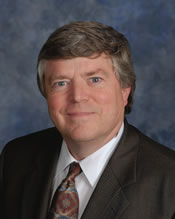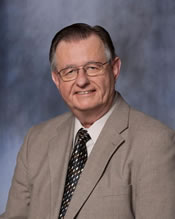
Rev. Bob Crossman
ABINGDON PRESS PHOTO
Say the word stewardship, and church people typically visualize an offering plate.
Each year, many pastors preach their "God loves a cheerful giver" sermons from 2 Corinthians during autumn stewardship campaigns. Finance committees write letters and make calls to get financial pledge cards returned so church budgets can be finalized. And congregants decide how much money they want to give.
But stewardship is more than just giving money to the church, or at least it's supposed to be. The Bible says disciples of Jesus Christ should give back from their resources, which include not only treasure, but time and talents. United Methodists vow to be faithful with their prayers, presence, gifts, service and witness—all part of holistic stewardship.
"The truth is that stewardship—the work of stewardship—is much broader than the fundraising connotation that it has received," said the Rev. Ken Sloane, director of stewardship for the General Board of Discipleship. "Holistic stewardship changes the focus from the church's need for money, to the people's need to give."
Churches have missions that require financial support, but, Sloane said, "we don't want people to give just because we need money. We want them to give because generosity is part of being a complete disciple of Jesus Christ. It's part of our spiritual growth to experience the joy that comes from generosity."
Audio: Crossman on holistic stewardship
Audio: Crossman on moving toward holistic stewardship
Holistic stewardship
The Rev. Robert (Bob) Crossman, minister of new church development for the Arkansas Conference and a strategist with Discipleship's Path 1 (New Church Starts) initiative, began developing a pathway to holistic stewardship while serving as pastor of Grace United Methodist Church in Conway, Ark .
Too often, Crossman said, the only time every member is contacted, a signature is requested or a first-class letter is sent—and the only report members receive at year's end about their participation in the church—is about money.
"Because of that, far too many of our members can almost truthfully say the only time the church thinks of me is when they want money," he said. "Now, that is not true. But because we place so much emphasis on money—or maybe I should say because we neglect other parts of stewardship and discipleship and works of mercy and works of piety—those members are correct when they say the only thing that the church really expects of me is money."
 Crossman's experience in Conway led to a book about holistic stewardship and a six-week program that presents giving as part of a lifelong journey in Christian discipleship. Committed to Christ: Six Steps to a Generous Life (Abingdon Press) has become a guide for many churches seeking to expand stewardship to include commitments to prayer, Bible reading, worship, witness and service—in addition to financial giving.
Crossman's experience in Conway led to a book about holistic stewardship and a six-week program that presents giving as part of a lifelong journey in Christian discipleship. Committed to Christ: Six Steps to a Generous Life (Abingdon Press) has become a guide for many churches seeking to expand stewardship to include commitments to prayer, Bible reading, worship, witness and service—in addition to financial giving.
'It was about Jesus.'
Crossman met resistance when he first suggested a holistic stewardship emphasis to the finance committee. "They pushed back and basically said, 'No, all we're really interested in is the money, and all these other pieces are going to dilute the message that we really need the money,'" Crossman said.
"What actually happened, though, is that at the end of our holistic stewardship emphasis, our actual member pledging households had gone up 17 percent, the actual amount pledged had gone up 58 percent and at the end of the first quarter, actual giving had gone up 64 percent."
The congregation responded to holistic stewardship, Crossman said because "it was about Jesus. It was about being a faithful disciple: I am praying. I am attending worship. I am serving with my hands. I am reading the scriptures. I am giving financial resources to the church because it is about being a faithful disciple."

Rev. Rodney Smothers
The Rev. Rodney T. Smothers regularly uses Committed to Christ when he coaches congregations as a Path 1 associate. This year, he also is teaching the material in Sunday school classes and sermons at the 400-member church he pastors, St. Paul United Methodist Church in Oxon Hill, Md. It is thought to be the oldest black congregation in the Baltimore-Washington Conference.
"This series does talk about finances, but it is not the predominate push. It really is about holistic generosity and (examining) lifestyle issues and the stewardship of life, not just dollars and dimes," Smothers said. "Holistic generosity says that life itself is a gift from God, and we honor that gift by understanding that it's not just about money. It really is about being a steward of things that God has entrusted to us."
"What you're really talking about is holistic discipleship, you're teaching people how to live—not just talk about—but to live as a disciple," Smothers said.
Give equal emphasis
Some churches make an effort to expand their stewardship focus by adding places on financial commitment cards for people to indicate if they will participate in other ways. However, Crossman said separate commitment cards are better than a combined card.
"It's real important that it not just be a footnote. We have tried through the years to have commitment cards where there's a little tiny box to check: I will pray. I will attend. I will worship. I will witness," Crossman said. "But then when it comes to money, we want to know if it's going to be weekly, monthly, quarterly, annually, by bank draft, by check, by stocks, by bonds, by gifts, in-kind gifts and real property."
Crossman suggested that churches might even expand holistic stewardship to include additional emphases, such as relationships, forgiveness, marriage and family. Rather than annual or quarterly commitments, pledges toward a particular stewardship emphasis could be made monthly and cards left on the kneeling rail when congregants receive the Lord's Supper.
Identify spiritual gifts

Rev. Edwin Zeiders
BETH IRVIN PHOTOGRAPHY
At St. Paul's United Methodist Church in State College, Pa., stewardship education is an ongoing, dynamic enterprise that begins with the training of confirmands and continues through all aspects of the church life of young people and adults, according to the Rev. Edwin Zeiders, senior pastor.
"Stewardship education and faithfulness are the DNA of St. Paul's. They're not part of it. They are it," Zeiders said. "It's not a programmatic approach. It's a spiritual enterprise through and through."
"We do spiritual gifts preparation with all the people who come into the church, and every confirmation class. Then we have a spiritual gifts coaching program that's a part of this," he said. Zeiders personally receives a list of parishioners with the results of their spiritual gift inventory.
Planning and work began late this spring on the stewardship education theme for 2014, "Generations of Generosity of Time, Talent and Treasure," which will build on the congregation's 125th anniversary.
"It's holistic in the sense that we're producing in a timely way a healthy conversation, literature that's related to an appropriate theme, focus groups, house groups, preaching (and) education that all supports this holistic approach, over a long period of time," Zeiders said.
St. Paul's stewardship education program will be rooted in the Eucharist on World Communion Sunday (Oct. 6), then celebrated the following Sunday, Zeiders said.
The preaching season for stewardship education will continue until Thanksgiving when "we give God thanks for the way in which St. Paul's is formed as a community of the faithful," he said. Commitments will be collected through the second week in January, then will be divided by time, talent and treasure.
"The treasure piece goes to our financial services department. The time and talent piece goes to the program agencies," said Zeiders.
"When I have staff meetings, I can go back to my directors and say, John Smith, hypothetically, has this gift. This person is your follow-up responsibility. And I direct that first-hand with the staff, so I know that the holistic approach is in the hands of our program directors."
Audio: Zeiders on discipleship and stewardship
Tom Gillem is a freelance writer and photographer in Brentwood, Tenn.
